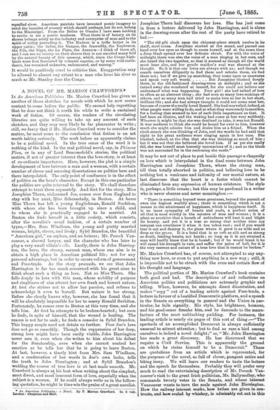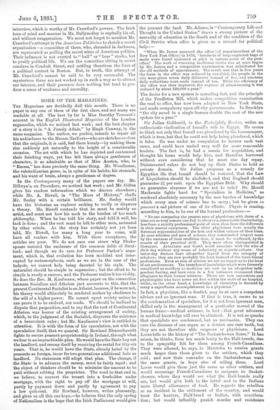A NOVEL OF MR. MARION CRAWFORD'S.*
IN An American Politician Mr. Marion Crawford has given us another of those sketches for novels with which he now seems content to come before the public. We cannot help regretting that he does not think it worth his while to write a sustained work of fiction. Of course, the readers of the circulating libraries are quite willing to take up any amount of each sketches, and they may very likely be far pleasanter to write ; still, we fancy that if Mr. Marion Crawford were to consider the matter, he must come to the conclusion that fiction is an art worth taking seriously. The work before us apparently claims to be a political noveL In the true sense of the word it is nothing of the kind. in the real political novel, say, in Pkineas Finn, or in any of Lord Beaconsfield's stories, the political motive, if not of greater interest than the love-story, is at least of co-ordinate importance. Here, however, the plot is a simple development of love between a man and a woman, with a certain number of clever and amusing dissertations on politics here and there interpolated. The only point of confluence is in the effect of politics on the hero's character. Except in this one particular the politics are quite external to the story. We shall therefore attempt to treat them separately. And first for the story. Miss Josephine Thorn, nicknamed Joe, comes over from England to stay with her aunt, Miss Schenectady, in Boston. At home Miss Thorn has left a young Englishman, Ronald Surbiton, with whom she has been brought up since a child, and to whom she is practically engaged to be married. At Boston she finds herself in a little society, which consists, after the novelist's usual fashion, of a certain number of types,—Mrs. Sam Windham, the young and pretty married woman, bright, clever, and lively; Sybil Brandon, the beautiful "American girl," an orphan, and an heiress ; Mr. Pocock Vancouver, a shrewd lawyer, and the character who has later to play a very small villain's rote. Lastly, there is John Harrington, the hero, the strong, earnest man, whose one aim is to obtain a high place in American political life ; not for any personal advantage, but in order to secure reform of government and Free-trade. As the story proceeds, we see that John Harrington is far too much concerned with his great aims to think about such a thing as love. Not so Miss Thorn. She falls deeply in love with this man, whose nobility of purpose and singleness of aim attract her own frank and honest nature. At first she strives not to allow her passion, and refuses to acknowledge it even to herself. But nature is too strong. Before she clearly knows why, however, she has found that it will be absolutely impossible for her to marry Ronald Sarbiton. Fortunately, he comes over to Boston at this very time, and she tells him. At first he attempts to be broken-hearted ; but soon be finds, in spite of himself, that the wound is healing. The reason is not far to seek ; he finds a consoler in Sybil Brandon. This happy couple need not detain us further. Poor Joe's love does not go so smoothly. Though the suppression of her deep, strong love might have been easily visible, John Harrington never sees it, even when she writes to him about his defeat for the Senatorship, even when she cannot control her emotion as he tells her that he is going to leave Boston. At last, however, a timely hint from Mrs. Sam Windham, and a confirmation of her words in Joe's own looks, tells the truth to John Harrington ; and at Sybil Brandon's wedding the course of true love is at last made smooth. Mr. Crawford is always at his best when writing about the simplest, most direct, and most innocent form of love, especially when the subject is a woman. If he could always write as in the following quotation, he might in time win the praise of a great novelist.
Josephine Thorn half discovers her love. She has just come in from a lecture delivered by John Harrington, and is alone in the drawing-room after the rest of the party have retired to bed :—
" The old gilt clock upon the ohimney-piece struck twelve in its shrill, steel tones. Josephine started at the sound, and passed one hand over her eyes as though to rouse herself, and at the same time a deep blush spread over her delicate cheek. For with the voice of midnight there was also the voice of a man ringing in her ears, and she heard the two together, so that it seemed as though all the world must hear also, and her gentle maiden's soul was shamed at the thought. So it is that our loves are always with us ; and though we search ourselves diligently to find them and rebuke them, we find them not; but if we give up searching, they come upon us unawares
and speak very soft words But Josephine blushed deeply there, in the old-fashioned drawing-room at midnight ; and as she turned away she wondered at herself, for she could not believe nor understand what was happening. Poor girl ! she had talked of love so often as an abstract thing ; she had seen so many love-makings of others, and so many men had tried to make love to her in her short, brilliant life ; and she had always thought it could not come near her, because of coarse she really loved Ronald. She had marvelled, indeed, at what people were willing to do, and at what they were ready to sacrifice, for a feeling that seemed to her of snob little importance as that. It had been an illusion, and the waking had come at last very suddenly. Whoever it might be that she was destined to take, it was not Ronald. It was madness to think she could be bound for ever to him, however much she might admire him and desire him as a friend. When the clock struck she was thinking of John, and the words he had said that night to his great audience were ringing again in her ears. She blushed, indeed, at the idea that she was thinking so much of him ; but it was not that she believed she loved him. If as yet she really did, she was herself most honestly unconscious of it ; and so the blush was not accounted for in the reckoning she made."
It may be not out of place to put beside this passage a rhapsody on love which is interpolated in the final scene between John Harrington and Josephine Thorn, where the strong man, till then totally absorbed in politics, and believing love to be nothing but a weakness and infirmity of our mortal nature, at last discovers that the heart is a factor which cannot be eliminated from any expression of human existence. The style is, perhaps, a little ornate ; but this may be pardoned in a writer who is never obscure and never meaningless :— " There is something beyond mere greatness, beyond the pursuit of even the highest worldly aims ; there is something which is not a means to the attainment of happiness, which is happiness itself. It is an inner sympathy of hearts and souls, a perfect union of all that is most worthy in the natures of man and woman ; it is a plant so sensitive that a breath of unkindness will hurt it and blight its beauty, and yet it is a tree so strong that neither time nor tempest can overthrow it when it has taken root ; and if you would tear it out and destroy it, the place where it grew is as wide and as deep as the grave. It is a bond that is as Eoft as silk and as strong as death, binding hearts, not hands ; so long as it is not strained a man will hardly know that he is bound ; but if he would break it he will spend his strength in vain, and suffer the pains of hell, for it is the very essence and nature of a true love that it cannot be broken."
Mr. Marion Crawford has, of course, not attempted to say anything new here, or even to put anything in a new way ; still, it is impossible not to be struck with the even and certain flow of his thought and language.
The political portion of Mr. Marion Crawford's book contains both good and bad. The descriptions of and reflections on American politics and politicians are extremely graphic and telling. When, however, he attempts direct dissertation, and makes " copy " out of a leading article against Free-trade, a lecture in favour of a beatified Democratic platform, and a speech in the Senate on everything in general and the Union in particular, he fails signally. His style, his brightness, humour, and his good-sense forsake him, and he descends to the manufacture of the most unblushing padding. For instance, the leading article is nearly six pages of this sort of thing :—"The spectacle of an accomplished Democrat is always sufficiently unusual to attract attention ; but to find so rare a bird among ourselves is indeed a novel delight ;" or, "Mr. John Harrington has made a great discovery. He has discovered that we require a Civil Service. This is apparently the ground on which he states himself to be a Democrat." These are quotations from an article which is represented, for the purposes of the novel, as full of clever, pungent satire and biting irony. We will leave our readers to taste the lecture and the speech for themselves. Probably they will prefer very much to read the entertaining description of Mr. Pocock Vancouver's visit to the great Irish politician, Mr. Ballymolloy, who commands twenty votes in the Senate, and whose interest Vancouver wants to turn the scale against John Harrington. How the railway interest works, how bribes are given in contracts, and how sealed by whiskey, is admirably set out in this
interview, which is worthy of Mr. Crawford's powers. The Irish tone of mind and manner in Mr. Ballymoney is capitally hit off, and without exaggeration. We must not forget to mention Mr. Crawford's attempt in the American. Politician. to sketch a secret organisation—a committee of three, who, shrouded in darkness, are represented as pulling the secret wires of American politics. Their influence is not exerted to "bull" or " bear " stocks, but to purify political life. We see the committee sitting in secret conclave in Conduit Street, and settling therefrom the lines of a political contest in Boston. But, in truth, this attempt of Mr. Crawford's cannot be said to be very successful. The mysterious three are not worked up in such a way as to attract our interest, and their presence does nothing but tend to produce a sense of weakness and unreality.



































 Previous page
Previous page